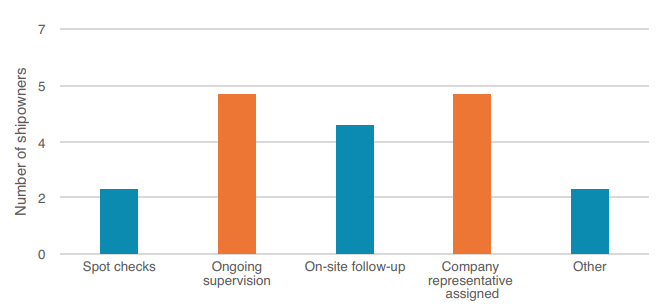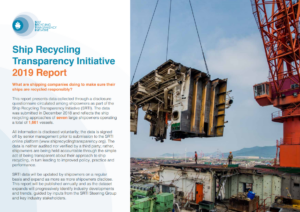The Ship Recycling Transparency Initiative (SRTI) launched its first report in Hong Kong, revealing that there is a growing movement stepping up the pressure on shipowners to disclose their approaches to ship recycling. The outcome was reached from data collected through a disclosure questionnaire circulated among shipowners.
Since the SRTI online platform went live just over two months ago eight large shipowners – operating a combined total of more than 1,800 vessels – have voluntarily shared data on their company’s ship recycling policies and practice.
All disclosing shipowners have a written policy on ship recycling for their own vessels covering issues related to the environment, labour and human rights in accordance with the Hong Kong Convention.
The data presented was submitted in December 2018 and reflects the ship recycling approaches of seven large shipowners operating a total of 1,661 vessels.
Key figures
-Ship recycling contract
- More than half of the disclosing shipowners use in-house developed agreements or contracts for the sale of vessels for green recycling; two shipowners use RECYCLECON from BIMCO
- 6 out of 7 disclosing shipowners’ contracts include an explicit requirement to recycle the vessel at a specific ship recycling facility; the same number develop individual ship recycling plans for each vessel
- 100% of shipowners require access to the ship recycling facility for monitoring during the recycling process. Almost all shipowners require access for performance follow-up, while five out of seven require access for control and stopping work during the recycling process
-Inventory of Hazardous Materials and ship-specific documentation
- 100% of disclosing shipowners provide the buyer/ship-recycler with a Class approved IHM at the time of finalising the ship-recycling contract
-Implementation of ship recycling policy and standard
- 6 out of 7 disclosing shipowners require the ship recycling facility to have a Hong Kong Convention statement of compliance issued by a Classification Society
- 100% of disclosing shipowners carry out additional audits to verify compliance prior to ship recycling
- 100% of disclosing shipowners monitor yard compliance during the ship recycling process
-Mechanisms for monitoring ship recycling process
Five out of seven shipowners monitor yard compliance during the recycling process through ongoing supervision and/or assigning a company representative for monitoring. Shipowners also conduct follow-up onsite and spot checks. Other means of monitoring include the deployment of a responsible ship recycling supervision team; independent third party approval and monitoring guided by an environmental and social action plan developed on the basis of an impact assessment.

-Issues covered by monitoring mechanisms
All disclosing shipowners’ monitoring mechanisms for their ship recycling policies address issues related to the environment, health and safety. Labour and human rights-related issues also feature highly in their monitoring.
Other issues covered by monitoring mechanisms include downstream facilities for managing waste and hazardous materials and subcontractors. Just under half of the disclosing shipowners’ monitoring mechanisms address anti-corruption-related issues.

Explore more herebelow:































































